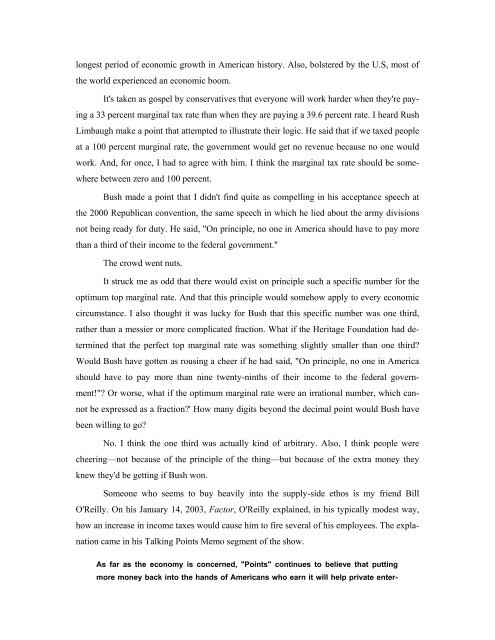Create successful ePaper yourself
Turn your PDF publications into a flip-book with our unique Google optimized e-Paper software.
longest period of economic growth in American history. Also, bolstered by <strong>the</strong> U.S, most of<br />
<strong>the</strong> world experienced an economic boom.<br />
It's taken as gospel by conservatives that everyone will work harder when <strong>the</strong>y're paying<br />
a 33 percent marginal tax rate than when <strong>the</strong>y are paying a 39.6 percent rate. I heard Rush<br />
Limbaugh make a point that attempted to illustrate <strong>the</strong>ir logic. He said that if we taxed people<br />
at a 100 percent marginal rate, <strong>the</strong> government would get no revenue because no one would<br />
work. <strong>And</strong>, for once, I had to agree with him. I think <strong>the</strong> marginal tax rate should be somewhere<br />
between zero and 100 percent.<br />
Bush made a point that I didn't find quite as compelling in his acceptance speech at<br />
<strong>the</strong> 2000 Republican convention, <strong>the</strong> same speech in which he lied about <strong>the</strong> army divisions<br />
not being ready for duty. He said, "On principle, no one in America should have to pay more<br />
than a third of <strong>the</strong>ir income to <strong>the</strong> federal government."<br />
The crowd went nuts.<br />
It struck me as odd that <strong>the</strong>re would exist on principle such a specific number for <strong>the</strong><br />
optimum top marginal rate. <strong>And</strong> that this principle would somehow apply to every economic<br />
circumstance. I also thought it was lucky for Bush that this specific number was one third,<br />
ra<strong>the</strong>r than a messier or more complicated fraction. What if <strong>the</strong> Heritage Foundation had determined<br />
that <strong>the</strong> perfect top marginal rate was something slightly smaller than one third?<br />
Would Bush have gotten as rousing a cheer if he had said, "On principle, no one in America<br />
should have to pay more than nine twenty-ninths of <strong>the</strong>ir income to <strong>the</strong> federal government!"?<br />
Or worse, what if <strong>the</strong> optimum marginal rate were an irrational number, which cannot<br />
be expressed as a fraction?' How many digits beyond <strong>the</strong> decimal point would Bush have<br />
been willing to go?<br />
No. I think <strong>the</strong> one third was actually kind of arbitrary. Also, I think people were<br />
cheering—not because of <strong>the</strong> principle of <strong>the</strong> thing—but because of <strong>the</strong> extra money <strong>the</strong>y<br />
knew <strong>the</strong>y'd be getting if Bush won.<br />
Someone who seems to buy heavily into <strong>the</strong> supply-side ethos is my friend Bill<br />
O'Reilly. On his January 14, 2003, Factor, O'Reilly explained, in his typically modest way,<br />
how an increase in income taxes would cause him to fire several of his employees. The explanation<br />
came in his Talking Points Memo segment of <strong>the</strong> show.<br />
As far as <strong>the</strong> economy is concerned, "Points" continues to believe that putting<br />
more money back into <strong>the</strong> hands of Americans who earn it will help private enter-








![The Big Lie 9-11 and Government Complicity in Mass Murder [PDF]](https://img.yumpu.com/50957077/1/190x245/the-big-lie-9-11-and-government-complicity-in-mass-murder-pdf.jpg?quality=85)








